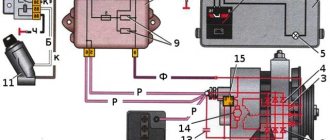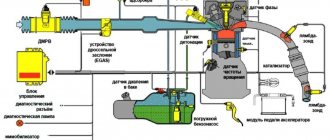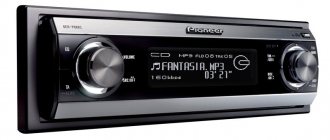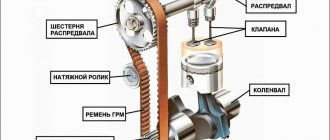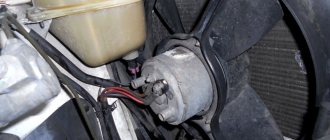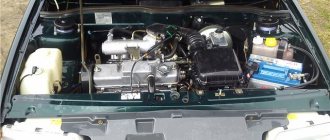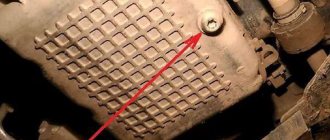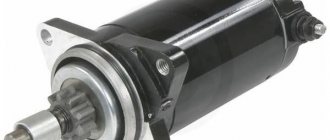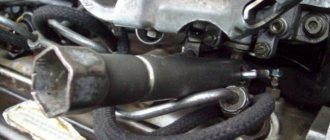Engine noise in modern cars is almost inaudible, but when idling and warming up it is above normal levels and should not be a cause for concern. But if knocking, muffled knocks, rustling and other unusual sounds appear when the engine is running, this indicates an engine malfunction that requires urgent intervention.
Simply put, when unusual sounds appear in the engine that were not previously heard, the intervention of experienced professionals is required, and the first thing they should do is conduct a thorough diagnosis of the car’s power unit at a car service center. The problem, most often, lies in the connecting rod and piston group, and in this case a major overhaul of the car will be required. The reason for the knocking sound is engine crankshaft play.
More common causes of excessively loud engine idling include:
- The electronic engine control unit increases speed to prevent engine stalling.
- Increased clearances are also one of the reasons for the increased noise of a running engine. Such increased gaps between the surface of the cylinders and pistons contribute to increased load on the units and, naturally, noise. When the parts heat up while the engine warms up, the gaps decrease and the noise subsides.
- If the car has a significant mileage of over 100,000 km, the cause of the unusual sound may be hydraulic compensators. Coking of the channels can become an obstacle to the operation of the oil pump and the flow of oil into the engine. At the same time, a characteristic “clatter” is heard, which decreases as the engine warms up and then disappears.
An increase in the engine speed of a cold engine occurs by enriching the fuel mixture. This compensates for unburned fuel, the cause of which is the reduced engine temperature. In addition, increased speed is necessary for stability of operation and sufficient lubrication of the rubbing surfaces of parts, since, due to the increased viscosity of the oil at low temperatures, the operation of the oil pump is difficult.
An increase in the number of revolutions during warm-up is also necessary to quickly achieve the optimal temperature of the catalyst and reduce the toxicity of exhaust gases.
As the engine temperature rises, the control unit reduces speed and the noise becomes weaker. Reducing noise after warming up also helps to reduce clearances and reduce oil viscosity. Therefore, increased noise when the engine warms up is not a sign of a car malfunction.
Faults that increase engine noise
When unnatural sounds appear in a running engine, the driver tries to understand their cause and, when he comes to a certain conclusion, seeks to fix the problem on his own or involve his friends who have the necessary experience.
The most significant malfunctions that cause unusual noise in a running engine:
- Use of low quality oils and fuel;
- Malfunctions of the lubrication system;
- Inappropriate temperature conditions;
- Problems with the ignition system;
- Worn timing belt;
- Malfunction of hydraulic compensators;
- Problems in the timing belt;
- Unstable operation of the idle speed controller;
- Malfunction of electrical systems.
So many malfunctions that are caused by extraneous or more powerful noises from the power unit can only be sorted out by a car service specialist, and that is where you should go.
Delay in this case will result in serious damage and the need for an expensive overhaul of the engine,
Too loud and too dull sound
This is the saddest noise that is difficult to confuse with anything. It appears in the area of the cylinder-piston group or crankshaft. Typically, such symptoms affect very old and heavily worn power units with high mileage. But there are also exceptions.
Piston knocks appear for various reasons. For example, sometimes this happens due to local overheating or wear of the piston skirts. In this case, the only solution to the problem will be a major overhaul. If a dull metallic sound occurs while driving, stop and check the oil level.
If, when you press the gas pedal hard or at high engine speeds, you notice characteristic knocking sounds with a loud response, it may be a sign of engine detonation. This is caused by the use of low quality or low octane fuel. The problem can be solved by replacing gasoline or using an anti-knock additive.
Sometimes a strong knock appears due to high engine temperature or incorrect ignition timing adjustment. To get rid of malfunctions, you need to adjust the ignition system and wait until the engine cools down.
Video about sounds from under the hood of a car:
Lubrication system problems
An insufficient amount of lubricating fluid in the system leads to a drop in pressure. As a result, the rubbing surfaces of the parts will be without sufficient lubrication, which will lead to their premature wear. It is also unacceptable to use low-quality oils or those that do not correspond to the type of engine, the viscosity of which will not allow high-quality lubrication of the mechanisms. In this case, the increased load on the engine will be accompanied by an increased noise level of its operation.
Another reason for a loud engine is insufficient lubrication of engine parts, which increase in size as the temperature rises and begin to noisily come into contact with other mechanisms and parts of the power unit without lubrication.
The entry of coolant into the lubrication system leads to dilution of the oil and loss of its necessary lubricating properties. At the same time, engine wear significantly exceeds established standards. If coolant gets into the lubrication system, it is necessary to immediately change the oil, filling in the required type for this engine.
Reasons why extraneous noise may appear in the engine
An experienced car owner can determine by the sound of the engine that there is a malfunction in the design. But even a beginner will find it easy to navigate and hear extraneous noise while driving. Creaking, crackling, howling, knocking and humming - all this can be produced by a motor. The more carefully we listen to extraneous sounds, the faster the breakdown can be repaired.
Shifting the piston - the piston reaches the top point and then moves down. At this point, extraneous sounds may appear if the piston and cylinders are worn out
Crank mechanism. If a dull sound comes from the bottom of the engine and increases as the load increases, then you need to check the crankshaft bearings. It is highly likely that the elements have been damaged. A connecting rod bearing with a larger gap will produce a higher, louder sound. The higher the speed, the louder the noise. In both cases, the cylinder block is at risk - the engine must be turned off immediately and the car must be sent for diagnostics.
Cylinder-piston group . Shifting the piston - the piston reaches the top point and then moves down. At this point, extraneous sounds may appear if the piston and cylinders are worn out. The main signs of this phenomenon can be identified. The sound is similar to a frequent knock - the larger the gap, the louder. The noise is especially loud when starting up in a cold environment. Another accurate sign is that the knocking noise is proportional to the engine speed. Many motorists operate cars with such a defect for several years, but receive not the most pleasant consequences. You have to pay for this with increased oil consumption. The possibility of serious engine damage cannot be ruled out.
If the noise is loud and frequent, then the hydraulic compensator is jammed and needs urgent replacement.
Gas distribution mechanism . You can often hear the phrase “valves knocking” in service centers. This indicates that the thermal gaps have increased and adjustments need to be made. If there is a problem, a loud knocking sound appears at the top of the engine. In this case, the drive of one valve or several at once may make noise. In the latter case, a clattering noise will be heard under the valve cover. Large gaps lead to damage to surfaces - they can break. If there is no gap at all, this can lead to burnout of the exhaust valve.
Hydraulic compensators . The devices automatically maintain the required thermal gap. If the element starts knocking after stopping, and then quiets down while driving, it means it is not holding oil. If the noise is loud and frequent, then the hydraulic compensator is jammed and needs urgent replacement.
Camshaft drive . If the belt is too tight, a whine will appear. Sound may come from the tension and bypass belt if the bearings are not lubricated. Such defects can lead to jamming of the rollers and even breakage of the timing belt.
The appearance of a howling indicates problems with the bearing of the cooling system pump.
Tensioner shoes . If your car has a timing chain drive, you may encounter rustling sounds from the chain links. The chain rarely breaks, but wear products can instantly clog the oil system. The worst outcome is if the loose chain jumps onto the gears. In this case, it will not be possible to avoid the valves meeting the pistons.
Turbocharging . If a slight whistle appears, this can be considered normal. If the noise intensifies and is supplemented by hissing, this may indicate a leak of air and gases. If a grinding noise appears in the turbocharger, it means that the wheels are catching the turbine volutes.
Cooling system . The appearance of a howling indicates problems with the bearing of the cooling system pump. If the pump is driven by a timing belt, the defect can lead to the death of the motor. In any case, you need to call a tow truck and send the car for repairs.
Bottom line . Extraneous sounds in the engine in most cases indicate defects. It is important to promptly identify the source of the noise and eliminate the problem.
Cooling system
The cause of premature detonation may be exceeding the permissible engine temperature due to damage to the thermostat. With such a malfunction, coolant will not flow into the radiator in sufficient quantity, which will lead to engine overheating.
If the thermostat breaks down, it is also possible for excess coolant to enter the radiator, which leads to an increased noise level of its operation. This malfunction can be eliminated by cleaning the thermostat or replacing it.
Muffler malfunction
The exhaust system of a car consists of many parts, and noise suppression starts from the engine. The more mileage a car has, the more wear and tear it wears on its exhaust system. Most often, the gasket between the muffler and the engine fails. For this reason, the noise level increases. To eliminate a malfunction of the exhaust system, in most cases it is necessary, having established the cause, to eliminate it by bringing the muffler into working condition, welding the defects, or replacing the gaskets or muffler.
How to eliminate diesel engine noise?
Sometimes the problem disappears after changing the oil and filter (if they are too dirty or were initially of poor quality).
But in most cases, only diagnostics using special scanning equipment will help identify the cause. Based on its results, problematic components and mechanisms are identified, a list of troubleshooting work and a list of necessary spare parts are compiled.
Important ! A diesel engine is a structurally complex unit that does not tolerate handicraft intervention. It cannot be repaired without special equipment and deep knowledge - this will only worsen the situation. Even minor problems should be repaired by a specialized car service center.
Hydraulic compensator noise
At idle, an unheated engine makes noise most often due to hydraulic compensators. When replacing worn hydraulic compensators with lightweight new ones, the noise level increases, while gasoline ones make the same noise as diesel ones.
The eight-valve engine produced by VAZ does not have hydraulic compensators. For this reason, such an engine requires periodic valve adjustment. If this is not done, the specific noise during engine operation will increase significantly. The engine with adjusted valves runs almost silently.
Loud chattering sounds
This type of noise is most often produced by foreign objects accidentally falling into attachments or moving parts of the motor. For example: pieces of insulation or plastic, leaves, branches, insects and others. Therefore, sometimes it is enough to look under the hood and pull out objects that accidentally appear there.
If the noise does not disappear, then these sounds may indicate more serious damage. As a rule, they indicate failure or delamination of the pump drive pulleys, power steering, and generator.
Electrical system problems
Malfunctions of the vehicle's electrical system manifest themselves in unstable engine operation, the formation of a poor-quality air-fuel mixture, and interruptions in the functioning of the cooling, ignition and other systems. With all these malfunctions, the engine noise level exceeds normal, but they do not exhaust the reasons for the increased noise. In particular, such reasons may be worn-out engine mounts, as well as cylinder block gaskets.
Such malfunctions can be eliminated either on your own or by involving car service specialists.
Crankshaft fault
Increased noise levels in both gasoline and diesel engines can be caused by abrasion of the crankshaft bearings or journals, bearing wear, insufficient lubrication, or the penetration of antifreeze or water into the lubrication system.
To summarize, we can say that the main reasons for increased noise levels during engine operation are problems:
- exhaust system;
- gas distribution mechanism;
- generator, including wear of bearings or belt;
- other malfunctions in which the “engine knocked.”
Engine knock
This type of extraneous noise occurs when one part of the motor hits another. This also indicates very high loads at the points of collision of these parts. You need to know that the more powerful the impact loads, the sooner the contacting surfaces are destroyed. And since the force of the impacts is directly related to the size of the gap, as it expands, the rate of depreciation of the parts also increases. In other words, various kinds of knocking indicate progressive wear of engine parts.
The main causes of engine knocking
Piston knock:
- widened gap between grooves and piston rings;
- expanded clearance between cylinders and pistons.
Knock of connecting rod and crankshaft main bearings:
- expanded gap between the main (rod) journals and bearings;
- early ignition;
- insufficient oil pressure.
Valve knock:
- extended valve clearances;
- damping of camshaft cams;
- Valve spring malfunction.
Noises in the camshaft drive:
- extended valve clearances;
- widened gaps between the levers and camshaft cams;
- expanded gap between the guide sleeve and the valve stem;
- extended valve clearances;
- camshaft cam wear.
